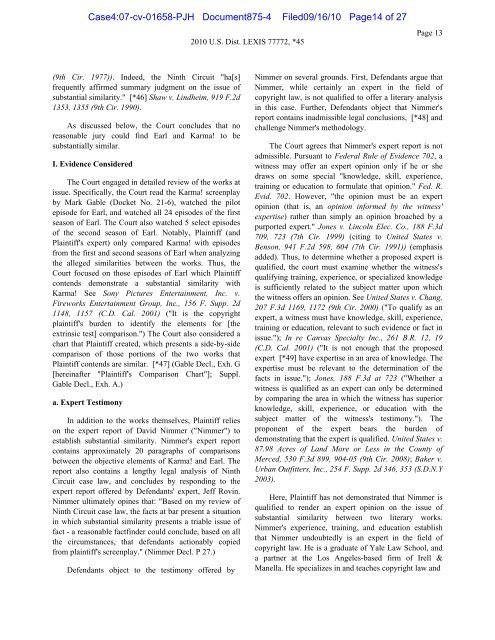exhibit 2 - SAP Lawsuit Portal
exhibit 2 - SAP Lawsuit Portal
exhibit 2 - SAP Lawsuit Portal
You also want an ePaper? Increase the reach of your titles
YUMPU automatically turns print PDFs into web optimized ePapers that Google loves.
Case4:07-cv-01658-PJH Document875-4 Filed09/16/10 Page14 of 27<br />
(9th Cir. 1977)). Indeed, the Ninth Circuit "ha[s]<br />
frequently affirmed summary judgment on the issue of<br />
substantial similarity." [*46] Shaw v. Lindheim, 919 F.2d<br />
1353, 1355 (9th Cir. 1990).<br />
As discussed below, the Court concludes that no<br />
reasonable jury could find Earl and Karma! to be<br />
substantially similar.<br />
I. Evidence Considered<br />
The Court engaged in detailed review of the works at<br />
issue. Specifically, the Court read the Karma! screenplay<br />
by Mark Gable (Docket No. 21-6), watched the pilot<br />
episode for Earl, and watched all 24 episodes of the first<br />
season of Earl. The Court also watched 5 select episodes<br />
of the second season of Earl. Notably, Plaintiff (and<br />
Plaintiff's expert) only compared Karma! with episodes<br />
from the first and second seasons of Earl when analyzing<br />
the alleged similarities between the works. Thus, the<br />
Court focused on those episodes of Earl which Plaintiff<br />
contends demonstrate a substantial similarity with<br />
Karma! See Sony Pictures Entertainment, Inc. v.<br />
Fireworks Entertainment Group, Inc., 156 F. Supp. 2d<br />
1148, 1157 (C.D. Cal. 2001) ("It is the copyright<br />
plaintiff's burden to identify the elements for [the<br />
extrinsic test] comparison.") The Court also considered a<br />
chart that Plaintiff created, which presents a side-by-side<br />
comparison of those portions of the two works that<br />
Plaintiff contends are similar. [*47] (Gable Decl., Exh. G<br />
[hereinafter "Plaintiff's Comparison Chart"]; Suppl.<br />
Gable Decl., Exh. A.)<br />
a. Expert Testimony<br />
In addition to the works themselves, Plaintiff relies<br />
on the expert report of David Nimmer ("Nimmer") to<br />
establish substantial similarity. Nimmer's expert report<br />
contains approximately 20 paragraphs of comparisons<br />
between the objective elements of Karma! and Earl. The<br />
report also contains a lengthy legal analysis of Ninth<br />
Circuit case law, and concludes by responding to the<br />
expert report offered by Defendants' expert, Jeff Rovin.<br />
Nimmer ultimately opines that: "Based on my review of<br />
Ninth Circuit case law, the facts at bar present a situation<br />
in which substantial similarity presents a triable issue of<br />
fact - a reasonable factfinder could conclude, based on all<br />
the circumstances, that defendants actionably copied<br />
from plaintiff's screenplay." (Nimmer Decl. P 27.)<br />
Defendants object to the testimony offered by<br />
2010 U.S. Dist. LEXIS 77772, *45<br />
Page 13<br />
Nimmer on several grounds. First, Defendants argue that<br />
Nimmer, while certainly an expert in the field of<br />
copyright law, is not qualified to offer a literary analysis<br />
in this case. Further, Defendants object that Nimmer's<br />
report contains inadmissible legal conclusions, [*48] and<br />
challenge Nimmer's methodology.<br />
The Court agrees that Nimmer's expert report is not<br />
admissible. Pursuant to Federal Rule of Evidence 702, a<br />
witness may offer an expert opinion only if he or she<br />
draws on some special "knowledge, skill, experience,<br />
training or education to formulate that opinion." Fed. R.<br />
Evid. 702. However, "the opinion must be an expert<br />
opinion (that is, an opinion informed by the witness'<br />
expertise) rather than simply an opinion broached by a<br />
purported expert." Jones v. Lincoln Elec. Co., 188 F.3d<br />
709, 723 (7th Cir. 1999) (citing to United States v.<br />
Benson, 941 F.2d 598, 604 (7th Cir. 1991)) (emphasis<br />
added). Thus, to determine whether a proposed expert is<br />
qualified, the court must examine whether the witness's<br />
qualifying training, experience, or specialized knowledge<br />
is sufficiently related to the subject matter upon which<br />
the witness offers an opinion. See United States v. Chang,<br />
207 F.3d 1169, 1172 (9th Cir. 2000) ("To qualify as an<br />
expert, a witness must have knowledge, skill, experience,<br />
training or education, relevant to such evidence or fact in<br />
issue."); In re Canvas Specialty Inc., 261 B.R. 12, 19<br />
(C.D. Cal. 2001) ("It is not enough that the proposed<br />
expert [*49] have expertise in an area of knowledge. The<br />
expertise must be relevant to the determination of the<br />
facts in issue."); Jones, 188 F.3d at 723 ("Whether a<br />
witness is qualified as an expert can only be determined<br />
by comparing the area in which the witness has superior<br />
knowledge, skill, experience, or education with the<br />
subject matter of the witness's testimony."). The<br />
proponent of the expert bears the burden of<br />
demonstrating that the expert is qualified. United States v.<br />
87.98 Acres of Land More or Less in the County of<br />
Merced, 530 F.3d 899, 904-05 (9th Cir. 2008); Baker v.<br />
Urban Outfitters, Inc., 254 F. Supp. 2d 346, 353 (S.D.N.Y<br />
2003).<br />
Here, Plaintiff has not demonstrated that Nimmer is<br />
qualified to render an expert opinion on the issue of<br />
substantial similarity between two literary works.<br />
Nimmer's experience, training, and education establish<br />
that Nimmer undoubtedly is an expert in the field of<br />
copyright law. He is a graduate of Yale Law School, and<br />
a partner at the Los Angeles-based firm of Irell &<br />
Manella. He specializes in and teaches copyright law and


